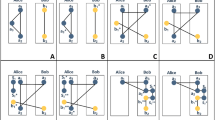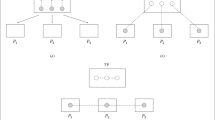Abstract
Owing to the disadvantages of susceptible to collusive attack in the existed multi-party quantum key agreement (MQKA) protocols with traveling mode, two secure MQKA protocols with traveling mode were proposed. In order to resist collusive attack, a trust party was introduced in the first protocol and additional random 0–1 sequence was added to the private key sequence of each participant in the second protocol. Compared to existed MQKA protocols with traveling mode, the proposed protocols have three considerable advantages. Firstly, due to the fact that only Bell state measurements and simple single-particle unitary transformation are used, the processions of the proposed protocols are simple and can be easily realized. Secondly, the proposed protocols can resist internal attack, especially collusive attack. Furthermore, the proposed protocols are superior to the existing traveling-mode MQKA protocols in efficiency. Hence, the proposed protocols have great significance both on theory and on practical application.


Similar content being viewed by others
References
Bennett, C.H., Brassard, G.: Quantum cryptography: public-key distribution and coin tossing. In: Proceedings of IEEE International Conference on Computer System and Signal Processing, pp. 175–179 (1984)
Lo, H.K., Chau, H.F.: Unconditional security of quantum key distribution over arbitrarily long distances. Science 283(5410), 2050–2056 (1999)
Lo, H.K., Ma, X., Chen, K.: Decoy state quantum key distribution. Phys. Rev. Lett. 94(23), 230504 (2005)
Li, H., Jiang, H., Gao, M., Ma, Z., Ma, C., Wang, W.: Statistical-fluctuation analysis for quantum key distribution with consideration of after-pulse contributions. Phys. Rev. A. 92(6), 062344 (2015)
Deng, F.G., Long, G.L.: Secure direct communication with a quantum one-time pad. Phys. Rev. A. 69(5), 052319 (2004)
Wang, C., Hao, L., Song, S.Y., Long, G.L.: Quantum direct communication based on quantum search algorithm. Int. J. Quantum Inf. 8(03), 443–450 (2010)
Pirandola, S., Braunstein, S.L., Lloyd, S., Mancini, S.: Confidential direct communications: a quantum approach using continuous variables. IEEE J. Sel. Top. Quantum Electron. 15(6), 1570–1580 (2009)
Pirandola, S., Braunstein, S.L., Mancini, S., Lloyd, S.: Quantum direct communication with continuous variables. Europhys. Lett. 84(2), 20013 (2008)
Hillery, M., Bužek, V., Berthiaume, A.: Quantum secret sharing. Phys. Rev. A 59(3), 1829–1834 (1999)
Cao, H., Ma, W.: (t, n) Threshold quantum state sharing scheme based on linear equations and unitary operation. IEEE Photon. J. 9(1), 1–7 (2017)
Puthoor, I.V., Amiri, R., Wallden, P., Curty, M., Andersson, E.: Measurement-device-independent quantum digital signatures. Phys. Rev. A. 94(2), 022328 (2016)
Wen, L., Yong-Bin, W., Wei, C.: Quantum private comparison protocol based on bell entangled states. Commun. Theor. Phys. 57(4), 583–588 (2012)
Liu, W., Wang, Y.B., Wang, X.M.: Multi-party quantum private comparison protocol using d dimensional basis states without entanglement swapping. Int. J. Theor. Phys. 53(4), 1085–1091 (2014)
Zhou, N., Zeng, G., Xiong, J.: Quantum key agreement protocol. Electron. Lett. 40(18), 1149–1150 (2004)
Tsai, C., Hwang, T.: On quantum key agreement protocol. In: Technical Report (C-S-I-E, NCKU, Taiwan), ROC (2009)
Chong, S.K., Hwang, T.: Quantum key agreement protocol based on BB84. Opt. Commun. 283(6), 1192–1195 (2010)
Liu, B., Gao, F., Wen, Q.Y.: Multiparty quantum key agreement with single particles. Quantum Inf. Process. 12(4), 3411–3420 (2013)
Chong, S.K., Tsai, C.W., Hwang, T.: Improvement on quantum key agreement protocol with maximally entangled states. Int. J. Theor. Phys. 50(6), 1793–1802 (2011)
Shi, R.H., Zhong, H.: Multi-party quantum key agreement with bell states and bell measurements. Quantum Inf. Process. 12(2), 921–932 (2013)
Shen, D.S., Ma, W.P., Wang, L.L.: Two-party quantum key agreement with four-qubit cluster states. Quantum Inf. Process. 13(10), 2313–2324 (2014)
Xu, G.B., Wen, Q.Y., Gao, F., Qin, S.J.: Novel multiparty quantum key agreement protocol with GHZ states. Quantum Inf. Process. 13(12), 2587–2594 (2014)
Huang, W., Wen, Q.Y., Liu, B., Gao, F., Sun, Y.: Quantum key agreement with epr pairs and single-particle measurements. Quantum Inf. Process. 13(3), 649–663 (2014)
Wang, Q.L., Sun, H.X., Huang, W.: Multi-party quantum private comparison protocol with n-level entangled states. Quantum Inf. Process. 13(11), 2370–2389 (2014)
Cao, H., Ma, W.: Multiparty quantum key agreement based on quantum search algorithm. Sci. Rep. 7, 45046 (2017)
Sun, Z., Zhang, C., Wang, P., Yu, J., Zhang, Y., Long, D.: Multi-party quantum key agreement by an entangled six-qubit state. Int. J. Theor. Phys. 55(3), 1920–1929 (2016)
Sun, Z., Yu, J., Wang, P.: Efficient multi-party quantum key agreement by cluster states. Quantum Inf. Process. 15(1), 373–384 (2016)
Sun, Z., Zhang, C., Wang, B., Li, Q., Long, D.: Improvements on multiparty quantum key agreement with single particles. Quantum Inf. Process. 12(11), 3411–3420 (2013)
Yin, X.R., Ma, W.P., Liu, W.Y.: Three-party quantum key agreement with two-photon entanglement. Int. J. Theor. Phys. 52(11), 3915–3921 (2013)
Shukla, C., Alam, N., Pathak, A.: Protocols of quantum key agreement solely using bell states and bell measurement. Quantum Inf. Process. 13(11), 2391–2405 (2014)
He, Y.F., Ma, W.P.: Two-party quantum key agreement with five-particle entangled states. Int. J. Quantum Inf. 15(03), 1750018 (2017)
Hsueh, C.C., Chen, C.Y.: Quantum key agreement protocol with maximally entangled states. In: Proceedings of the 14th Information Security Conference (ISC 2004), pp. 236–242 (2004)
Tsai, C.W., Chong, S.K., Hwang, T.: Comment on quantum key agreement protocol with maximally entangled states. In: Proceedings of the 20th Cryptology and Information Security Conference (CISC2010), pp. 210–213 (2010)
Huang, W., Su, Q., Xu, B.J., Liu, B., Fan, F., Jia, H.Y., Yang, Y.H.: Improved multiparty quantum key agreement in travelling mode. Sci. China Phys. Mech. Astronom. 59(12), 120311 (2016)
Zhu, Z.C., Hu, A.Q., Fu, A.M.: Improving the security of protocols of quantum key agreement solely using Bell states and Bell measurement. Quantum Inf. Process. 14(11), 4245–4254 (2015)
Shor, P.W., Preskill, J.: Simple proof of security of the BB84 quantum key distribution protocol. Phys. Rev. Lett. 85(2), 441 (2000)
Acknowledgements
This work was supported in part by the National Key R&D Program of China under Grant No. 2017YFB0802400, the National Science Foundation of China under Grant Nos. 61373171 and 61702007, the 111 Project under Grant No. B08038, the Key Project of Science Research of Anhui Province under Grant No. KJ2017A519 and the Basic Research Project of Natural Science of Shaanxi Province under Grant No. 2017JM6037.
Author information
Authors and Affiliations
Corresponding author
Rights and permissions
About this article
Cite this article
Cao, H., Ma, W. Multi-party traveling-mode quantum key agreement protocols immune to collusive attack. Quantum Inf Process 17, 219 (2018). https://doi.org/10.1007/s11128-018-1993-8
Received:
Accepted:
Published:
DOI: https://doi.org/10.1007/s11128-018-1993-8




